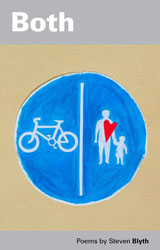Both
Steven Blyth
Price: £7.95

Steven Blyth writes in praise of domesticity, of the triumphs and failures of a life defined by family, friends, work and love. He watches himself as a son, a lover, a husband, a dad and an office middle manager, exploring the small disappointments and large hopes just below the surface of everyday living. Both is partly a hymn to a 1970s childhood spent in Sunday–school and school, playgrounds and parks, to old girlfriends, parents, neighbours, uncles, great grandmas and aunts 'three–million times removed'. It's also a book about Masculinity and Class, family Christmases and Corporate Strategy meetings. It's a Carry On film, 'the sort in which characters / Chortle, chuckle, guffaw, giggle or titter, / But never really laugh.'Steven Blyth follows in the footsteps of fellow Northern Realists Jim Burns, Geoff Hattersley, Peter Sansom and Ian McMillan down Dead Pan Alley to explain how time and memory work against relationships, how we are constructed by shared memories, unspoken arguments and secrets, and how beneath its rows, resentments and worries, family life constantly reveals its peculiar sense of belonging and happiness.
I thought my dad was a secret agent. Manilla envelopes would arrive marked On Her Majesty's Service. Like the title of that Bond film. The word secret was missed but who cares when you're ten, watching him bent, night after night, over a drawing table, doing plans for his MI5 masters. He'd dismantle dividers and compass, clip them in a box placed out of my reach. Gadgets from Q Division? Most suspicious, the way he'd tell me and my sister not to mention this work out on our street. All that hush hush stuff was down to the tax – declared little of what he earned on Her Majesty's forms, worried about snitching nosey neighbours. A day job draughtsman drawing plans on the side – granny flats, conservatories, extensions to kitchens... It paid for holidays and Christmas presents, for a birthday party clown or conjuror. All those evenings and weekends he spent earning that bit extra for us. I wonder if he resented it then or still resents, thinking of all the other dads who went down to the pub, the match, the golf club? 'No. Course not. Don't be daft,' he'll say if asked. But changes subject, unwilling to be pushed, as if bound by some official secrets act.
It's Sunday morning in the park. My son is riding his new bike. I'm relaxing on a bench. We're both having a good time. A thrill for both of us this first real spin without stabilisers. Both of us laughing at any dog that tries to catch him. No chance! Both of us treating like treasure conkers he's found. A good time for sure. But enough, I wonder, to earn its place in both our memories when he's older? With my own parents, I too often find only they or I recall. Like the Christmas I ate my sister's selection box. Laughter from them. I just shrug. They're equally blind to my memory of my mother's shriek when the neighbours' cat killed a grass snake. I sit here feeling sad that this moment might only be shared now, could be a blank to one of us in years to come. Sadness made worse when I see him so distant, peddling on the other side of the park, as distant as failed memory might make us. Sadness soon gone, though, when he stops his bike to look for me and waves and I wave back.
for Jim Burns We're laughing about the times we've skived off from our various jobs. Your greatest achievement was forty odd years ago taking your time, detours and the long way round while delivering the army's mail in Germany. My best was months of faking errands to Manchester after working out no one at the firm asked or noticed what a junior was doing. We feel proud of it because it means we've never taken work too seriously, and let it grind us down, take us over. It leads me to tell you about the time I caught Rachel in Typing reading a Jackie Collins novel from inside her open desk drawer. I told her to carry on but maybe try something better next time – Hemingway, Kerouac, Joyce. You say, ‘There's a poem there.' I agree and say, ‘You can have that one.' You tell me it's mine, I insist it's all yours. We pass it to each other for a while – pretending we can skive off that job too.
'a strangely poignant and far reaching poetry.'
Peter Reading, TLS
'Has plenty to say about the odder moments of gratification or suffering in everyday life, and says it approachably.'
Alan Brownjohn, Sunday Times
'What Blyth excels at is capturing the moment of life and allowing it to crystallise into insight which verges on the tender.'
Stride
'Steven Blyth's unsentimental portrayal of day–to–day working class life is hugely entertaining and extremely funny.'
Critical Survey